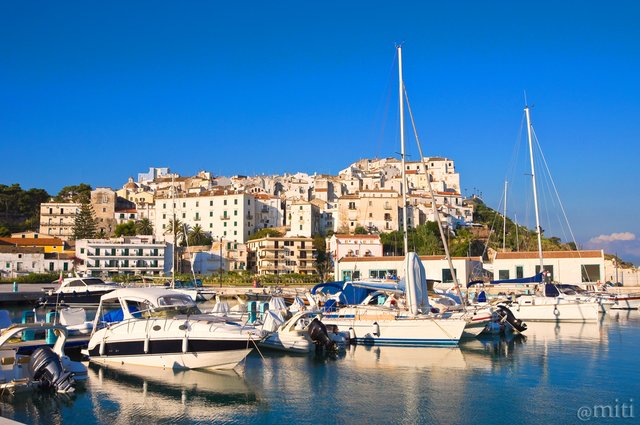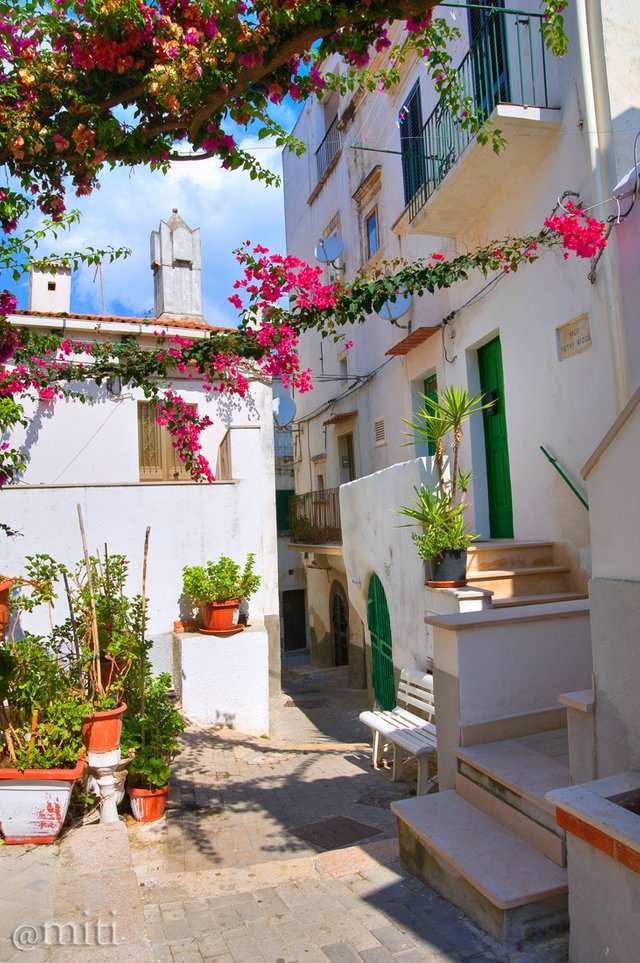A Journey through Italy: one photo every day #78 - RODI GARGANICO [ENG/ITA]

A panoramic view of Rodi Garganico (Author's photo - All rights reserved)
Vista panoramica di Rodi Garganico (Immagine dell'autore - tutti i diritti sono riservati)



Ciao a tutti,
questo è un viaggio attraverso l'Italia. Posterò una foto al giorno con una brevissima descrizione. Spero vi piaccia!

Rodi Garganico è un piccolo borgo della provincia di Foggia, nella regione italiana meridionale della Puglia. Si erge su un piccolo promontorio a picco sul mare e conserva ancora alcune torri e tesori archeologici che raccontano l'antica storia della colonia greca e romana.
Fu fondata dai Cretesi come punto di sosta lungo la rotta per Rodi, e i Rodiani la conquistarono nell'VIII secolo aC, dando il nome al luogo.
Sotto i Romani prese il nome di Uria, poi nel Medioevo fu circondata da mura con torri, ed era governata dalle famiglie De Riccardiis, Carafa, Caracciolo, Spinelli, Brancia e Sanfelice.
È stato per secoli un porto commerciale con la Dalmazia, il Medio Oriente e gli altri paesi del Mediterraneo.
Il castello, residenza reale del re Ferdinando d'Aragona, si affaccia sul mare, con le torri e le imponenti mura della città. Il centro storico, circondato da fortezze, è un labirinto di stradine tortuose, scale in pendenza, archi e piccoli giardini, dove si apprezzano le case bianche con il tetto rosso, costruite l'una sull'altra come un modo per proteggere la città dagli attacchi dei pirati.
Molti visitatori vengono a Rodi Garganico principalmente per la sua posizione costiera, con ampie spiagge sabbiose che regolarmente vengono premiate con il riconoscimento della Bandiera Blu per la pulizia e le strutture.
Ma il centro di Rodi Garganico è una meta da non perdere. La Chiesa dedicata al "Santuario della Madonna della Libera", in cui è conservata e venerata un'immagine della Madonna; il primo convento francescano, ora Chiesa di San Pietro e Paolo, che faceva parte di un convento costruito ai tempi di San Francesco d'Assisi (1182-1226).
C'è anche un belvedere che si affaccia sulle mura della città, con il Castello Aragonese e la torre angolare dello "Spuntone". La Chiesa del Crocifisso, che è uno dei monumenti storici più importanti della città.
Questa fu la prima chiesa parrocchiale della città, poi chiusa a causa dei danni causati dal terremoto che colpì l'area nel 1679. Ricostruita ripetutamente, la chiesa ha una navata con sei altari e rilievi policromi raffiguranti i quattro Evangelisti.
Meritano una visita la Chiesa di San Nicola da Mira, con un tipico campanile bizantino e il Convento dei Cappuccini.
Rodi Garganico ha un porto che fornisce collegamenti con le Isole Tremiti e le linee per la parte opposta della costa della Dalmazia. L'economia è basata sul turismo, la pesca e l'agricoltura, in particolare arance e limoni; Rodi è nota per la produzione di agrumi del Gargano. Tra questi, le arance e limoni del Femminello del Gargano, oggi riconosciuti come prodotti IGP.
Cosa vedere: il Centro storico, la Chiesa dedicata al 'Santuario della Madonna della Libera', la Chiesa di San Pietro e Paolo, il Belvedere, il Castello Aragonese, La Chiesa del Crocifisso , la Chiesa di San Nicola da Mira, il Convento dei Cappuccini, le spiagge sabbiose.

Hello everyone,
I began a Photo Journey through Italy. I will post one photo every day with a little note of explanation. I hope you like it!

Rodi Garganico is a small town in the province of Foggia, in the southern Italian region of Puglia. It stands on a small promontory overlooking the sea and still preserves some towers and archaeological treasures that tell the ancient history of the Greek and Roman colony.
It was founded by the Cretans as a stopping place along the route to Rhodes, and the Rhodians took it over in the 8th century BC, giving the place their name.
Under the Romans it was called Uria, then in the Middle Ages was surrounded by walls with towers, and was ruled by the De Riccardiis, Carafa, Caracciolo, Spinelli, Brancia and Sanfelice families.
It was for centuries a busy trading port with Dalmatia, the Middle East and the other Mediterranean countries.
The castle, royal residence of the King Ferdinand of Aragon, overlooks the sea, with the towers and the impressive city walls. The historic centre, surrounded by keeps, is a maze of winding streets, sloping stairs, arches and small gardens, where you are amazed by the gentle whitewashed houses with red roof, built one on the other as a way to protect the town from pirates attacks.
Many visitors come to Rodi Garganico primarily because of its coastal location, with extensive sandy beaches that regurarly get awarded the Blue Flag award for cleanliness and facilities.
But Rodi Garganico town centre is a destination not to miss. The Church dedicated to the 'Shrine of Our Lady of the Libera’, in which a venerated image of Our Lady is held; the first Franciscan convent, now the Church of St. Peter and Paul, which was formerly part of a convent built at the time of St. Francis of Assisi (1182-1226).
There is also a Belvedere which overlooks the city walls, with the Aragonese Castle in the corner tower of the "Spuntone". The Church of the Crucifix, which is one of the most important historical monuments of the city.
This was the first parish Church of the city, then later closed due to damage by the earthquake that struck the area in 1679. Repeatedly re-built, the church has a nave with six altars and polychrome reliefs depicting the four Evangelists.
Worth a visit the Church of San Nicola from Mira, with a typical byzantine belltower and the Convent of the Capuchins.
Rodi Garganico has a port that provide connections to the Tremiti Islands and lines to opposite Dalmatian coast. The economy is based on tourism, fishing and agriculture, especially oranges and lemons; it is known for the production of citrus fruit of the Gargano. Among these, the Gargano oranges and lemons Femminello, recognized today as IGP products.
Thing to see: the Historic center, the Church dedicated to the 'Shrine of Our Lady of the Libera’, the Church of St. Peter and Paul, the Belvedere, the Aragonese Castle, The Church of the Crucifix, the Church of San Nicola from Mira, the Convent of the Capuchins, the sandy beaches.

| Tipo di foto / Category | Paesaggio / Landscape view |
| Esposizione / Settings | 1/400 sec, ISO 200, f/11 |
| Camera | Nikon D5000 |
| Lente / Lens | Tamron SP 17-50mm f/2.8 XR Di II LD |
| Filtro / Filter | Polarizzatore Hoya / Hoya Polarizing filter |
| Cavalletto / Tripod | Manfrotto MKC3-P01 |
| Località / Location | Rodi Garganico (Foggia), Italia |
| Software | Photoshop |


Alleyway in the historical center (Author's photo - All rights reserved)
Vicolo del centro storico (Immagine dell'autore - tutti i diritti sono riservati)
It is a wonderful place for travelling!
Yes, it is!
lovely sunshine..
Congratulations, Your Post Has Been Added To The Steemit Worldmap!
Author link: http://steemitworldmap.com?author=miti
Post link: http://steemitworldmap.com?post=a-journey-through-italy-one-photo-every-day-78-rodi-garganico-eng-ita
Want to have your post on the map too?
Que bello paisaje espectacular la creacion
De Dios. Espero q me sigas Dios te bendiga!!
Friend miti, It must be beautiful the sea view. The 2 photographs are beautiful.
Thanks my friend.
amazing visiting place in world.
That's true.
Nothing can beat travelling in refreshing one's soul.
Yes, that is very true.
Wonderful! In one week I will go to Sardegna, Italy for holiday! I can't wait to see these amazing landscapes:X:X:X
Well, have a good trip!
Italy nice place and nice flower
Yes, Italy has an ideal climate for growing flowers.
this is a good post. i really liked panoramic view of rodi gargancio.
Thanks.
La conosco, un posto veramente incantevole...
Si, bellissimo sia per il mare che per l'aspetto storico.